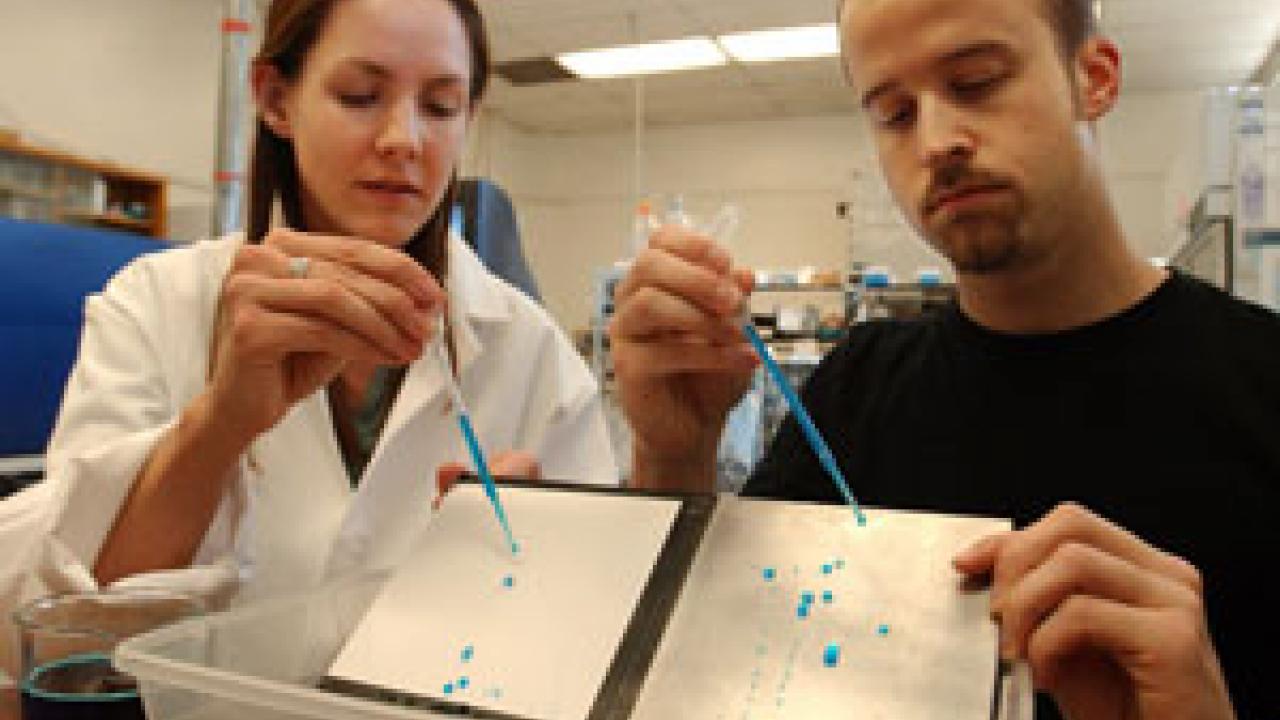Kara Schmelzer has been busy in the science lab. The UC Davis doctoral candidate has been investigating the biological effects of new anti-inflammatory drugs and testing the durability of a new formula for ship paint.
But now she's getting down to business to help both research ventures succeed in the marketplace.
Schmelzer is one of nine doctoral students and postdoctoral scholars developing the skills to commercialize research through a new certificate program in business development. "I really want to understand how the business and science intersect," she said.
The one-year program, offered by the Graduate School of Management in collaboration with the Office of Research's Technology and Industry Alliances, puts the scientists and Master of Business Administration students together to learn how to develop new business ventures from research.
It is one of the ways the small management school is leveraging its strengths by collaborating with other campus units and is also furthering UC Davis' efforts to develop a more entrepreneurial culture.
"The program is the best thing we have going in entrepreneurship at UC Davis," said venture capitalist Scott Lenet of the program he is helping teach.
Andrew Hargadon, director of technology management programs for the management school, says the scientists are learning how to translate their research into viable products for investment and the competitive market. The MBA students, meanwhile, are learning to work with the complexities and uncertainties of actual research and technology.
For successfully completing two practicums and three courses -- on managing innovation, managing technology, and new and small ventures, the scientists will receive a certificate in business development. The MBA students earn academic credits toward their degree.
Preparation for startups, industry
The program is designed to prepare its graduates to successfully license research, start new ventures, or work in corporate research and development.
In a recent class, Hargadon focused students on the heart of the program: "This is the next three to five years of your life you're deciding to pursue." And the associate professor, who studies innovation, encouraged students to find out what more they need to know to feel comfortable moving forward with a business proposal.
Schmelzer, who works in Professor Bruce Hammock's lab, wants to help him bring to market new anti-inflammatory drugs that could change the way doctors treat high blood pressure. And building on her four-year experience in the U.S. Navy, she has formulated a new ship paint that chemically interacts with metal for better bonding and durability.
"I would love to work with business people, know how to understand their language and get the product to market," said the candidate in pharmacology and toxicology.
And already, she has learned to command the language of business -- abbreviations like OEM (original equipment manufacturer), SWOT (strengths, weaknesses, opportunities and threats) and P&L (profit and loss) flow freely in her conversation.
Scientists in the inaugural class are from a variety of disciplines and campus units including electrical engineering, biochemistry and molecular biology, the Center for Biostabilization, veterinary medicine, the Institute of Transportation Studies, computer science and genetics.
Lots of good ideas
Some students want to start their own ventures. Others want to work in industry. Their current research includes designing specialized microelectronic circuits for telecommunication devices, developing cancer therapies, bringing freeze-dried blood to market for long-term storage, and helping to reduce the cost of hydrogen as a vehicle fuel.
"It's eye-opening," Schmelzer said of the expertise that the students share in class.
Working in small teams, the scientists and MBA students study business design and development, quickly model and evaluate new ventures -- pursuing the most promising -- and write business plans. They have considered business models for their proposals, talked to potential customers and prepared "elevator" or brief pitches for funding.
The students' own ideas are on the table, and the university's Technology Transfer Center has contributed about 35 others from UC Davis research.
David McGee, executive director of the center and business development for the research office, said the center will review the students' work on the ideas it provided.
"What we're seeing is a lot of creativity and a lot of ingenuity in a very short time," said McGee, who is co-teaching a practicum this quarter.
Lenet of DFJ Frontier has his own way of indicating the same. When he evaluates the students' presentations, he sometimes adds an "I" with a circle around it.
"That means I think this is a good idea, and I want to know more," he said. "These are ideas that could be funded by venture capitalists or make the world a better place."
In the spring quarter practicum, students will choose one idea to pursue. "They'll be really going about all the early-stage activities to get a company off the ground," said Lenet.
Schmelzer and MBA partner Aaron Clements will resume work on the ship paint, now being weather tested in the lab. One of their tasks will be to determine how much the paint will cost to make in a factory.
"We'll be talking to people who do these things on an industrial scale," Schmelzer said.
Farley Stewart, one of about 25 MBA students taking the winter practicum, is working with a team on his idea to offer decision-making software to schedule flights for an emerging air-taxi industry.
And while he has behind him an undergraduate degree in electrical engineering, experience starting a software business, and a commercial rating as a pilot of single-engine planes -- he appreciates the contributions of the scientists.
"It's been fantastic," he said. "They bring a whole other perspective."
Media Resources
Julia Ann Easley, General news (emphasis: business, K-12 outreach, education, law, government and student affairs), 530-752-8248, jaeasley@ucdavis.edu
